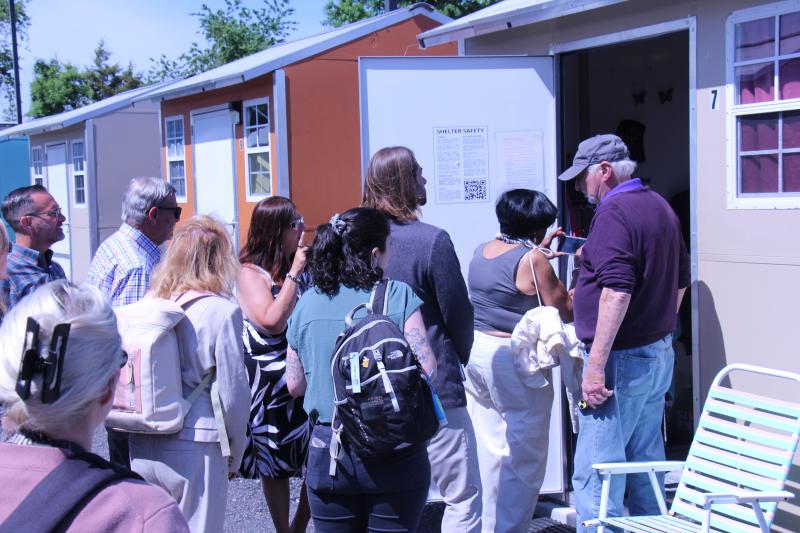Pallet Village organizers seek help to expand efforts
Abdul Qadhafi led state legislators and others through Pallet Village May 12, hoping to convince them to support projects similar to the one in Georgetown that is giving him hope.
Originally from Wilmington, Qadhafi, 62, said he spent a third of his life in prison and lived for decades on the street. He said he had a rough childhood in gangs, committing crimes and developing substance abuse issues. He ended up living in a tent in the woods outside Georgetown.
Qhadhafi had quit alcohol and drugs on his own two years ago and was looking to make a future for himself when he moved into Pallet Village, a cluster of 40 small shelters that provide transitional housing to the homeless. He was hired as a security guard there.
“This structure helped me along the way,” Qadafi said. “I thought this day would never, ever be possible because of my background.”
He was giving back May 12, showing the work of Springboard Delaware, which operates Pallet Village on Kimmey Street.
The group invited legislators and other groups to see what it has accomplished and ask for increased state funding to pay operating expenses of a planned 50-unit housing complex, about $750,000 per year. No site has been chosen. Springboard Delaware has $1.4 million in American Rescue Plan Act funds to help cover construction costs.
The organization changed its name last year from Springboard Collaborative to recognize its expanded role to lobby for similar projects across the state.
“We need help with operational expenses,” said Georgetown Mayor Bill West before Springboard Delaware began offering tours to those in attendance May 12. West has been a supporter of the project since its inception.
Georgetown appropriated $700,000 from its American Rescue Plan Act funding to build a community center for residents of Pallet Village, which is nearly completed.
West said 80 people have moved on to permanent housing after living at Pallet Village.
“One of the reasons we wanted you here today was to talk about not just what we’ve done in Georgetown, but how we want to do it across the state,” said Judson Malone, executive director of Springboard Delaware.
Malone said his group is trying to convince the state to increase the Emergency and Transitional Housing Operations Grant program from the current $1.6 million to $5 million to support the work of Springboard Delaware and other programs. Funds have been split among a dozen agencies to provide temporary housing and related services.
“It’s not very much money,” Malone said. “We’re hoping they can increase it.”
His group is looking to improve the design of the next project, in collaboration with Georgetown-based home builder Great Outdoor Cottages and Tiny Estates, a developer of tiny house communities based in Pennsylvania, that does work around the country.
Great Outdoor Cottages CEO Matthew Kraeuter said the design would comply with zoning and fire codes, and construction materials will be similar to those used in single-family homes.
Kraeuter said he was approached four months ago by Abbey Shaw of Tiny Estates, who was working on a concept for small residential communities for the homeless.
Shaw said plans call for blocks of five residential units that can be delivered on a trailer. She said her company learned from Pallet Village’s experiences. The proposed housing units cost $25,000 each with solar power and $23,000 without, she said.
“It takes all of us to make this work,” said Bernice Edwards, executive director of First State Community Action Agency, which owns the Pallet Village site and provides case management for its residents.
Rep. Valerie Jones Giltner, R-Georgetown, said after the presentation that the request for more funds will be a hard sell, as her party is pushing to curb spending increases proposed by Gov. Matt Meyer.
“We don’t expect this to be a 100% state-funded operation,” Malone said, calling for a public-private partnership. “But it does need to be majority funded by the state.”
West said Qadhafi is one of the success stories of Pallet Village.
Last week, Qadhafi got his driver’s license back. He said he has four bank accounts and a credit card, a job and is proud to call West his friend.
“Life is a continuing struggle,” Qadhafi said. “We’re all different. We come from different backgrounds. That was my past. At the end of the day, I had to rectify it. I just thank the Lord for this stepping stone right here. It gave me inspiration.”
Kevin Conlon came to the Cape Gazette with nearly 40 years of newspaper experience since graduating from St. Bonaventure University in New York with a bachelor's degree in mass communication. He reports on Sussex County government and other assignments as needed.
His career spans working as a reporter and editor at daily newspapers in upstate New York, including The Daily Gazette in Schenectady. He comes to the Cape Gazette from the Cortland Standard, where he was an editor for more than 25 years, and in recent years also contributed as a columnist and opinion page writer. He and his staff won regional and state writing awards.
Conlon was relocating to Lewes when he came across an advertisement for a reporter job at the Cape Gazette, and the decision to pursue it paid off. His new position gives him an opportunity to stay in a career that he loves, covering local news for an independently owned newspaper.
Conlon is the father of seven children and grandfather to two young boys. In his spare time, he trains for and competes in triathlons and other races. Now settling into the Cape Region, he is searching out hilly trails and roads with wide shoulders. He is a fan of St. Bonaventure sports, especially rugby and basketball, as well as following the Mets, Steelers and Celtics.






















































